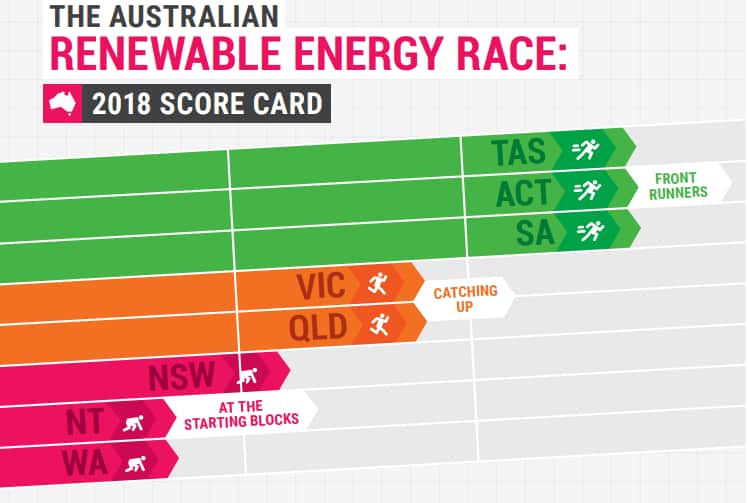Tasmania, the ACT and South Australia have won the latest installment of Australia's "renewable energy race", with Western Australia, the Northern Territory and NSW faring poorly.
The Climate Council launched a report on Tuesday, which rated states and territories based on their performance across a range of clean energy metrics.
These included each state or territory's percentage of renewable electricity, the proportion of households with solar and policies that support renewable energy.

It found Tasmania drew 87.4 per cent of its electricity from clean energy sources in 2017, with the ACT at 46.2 per cent and South Australia at 43.4 per cent. These states and territory were given an "A".
Victoria and Queensland both scored a "B". Queensland's relatively low 7.1 per cent was offset by the nation's highest proportion of solar households.
Meanwhile, NSW, Western Australia and the Northern Territory were at the bottom of the class.
The Climate Council's Greg Bourne said "the federal government has failed on energy and climate change policy. In five years there have been no effective policies introduced and Australia's pollution has risen year on year."
"States, territory governments and businesses have stepped into the vacuum and are leading Australia’s transition to clean power."
The renewable targets for Tasmania and the ACT are both 100 per cent by 2022 and 2020. Victoria's is 25 per cent by 2020 and 40 by 2025. Queensland and the NT have 50 per cent targets by 2030.
South Australia, Western Australia and New South Wales don't have renewable energy targets.
But the Grattan Institute's Tony Wood said "an uncoordinated approach by states and territories, possibly with industry doing their own thing, ends up inevitably being much messier, much harder to achieve coordinated progress, and almost certainly more expensive".
"And that's not a good thing for Australians, Australian homes and Australian businesses."

